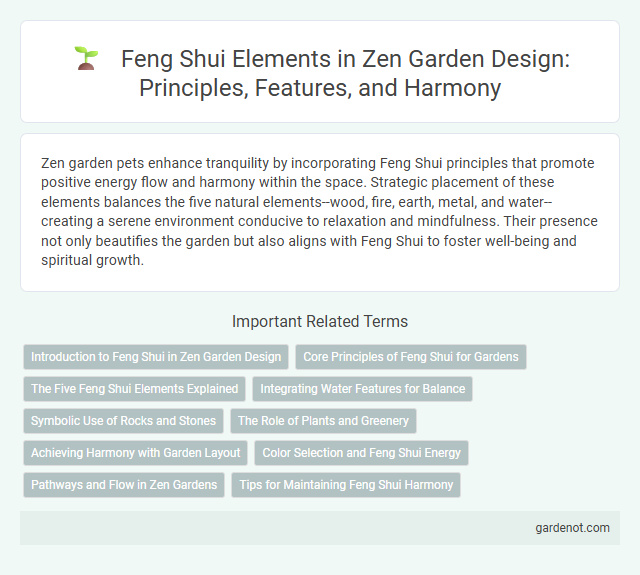Zen garden pets enhance tranquility by incorporating Feng Shui principles that promote positive energy flow and harmony within the space. Strategic placement of these elements balances the five natural elements--wood, fire, earth, metal, and water--creating a serene environment conducive to relaxation and mindfulness. Their presence not only beautifies the garden but also aligns with Feng Shui to foster well-being and spiritual growth.
Introduction to Feng Shui in Zen Garden Design
Feng Shui principles in Zen garden design emphasize harmony, balance, and the flow of positive energy through carefully arranged natural elements like rocks, water, and plants. Strategic placement of these features enhances chi circulation, promoting tranquility and well-being in the outdoor space. Integrating Feng Shui creates a serene environment that supports meditation and mindful relaxation.
Core Principles of Feng Shui for Gardens
Core principles of Feng Shui for gardens emphasize harmony, balance, and energy flow, integrating natural elements such as water, rocks, and plants to promote tranquility and positive chi. The garden layout aligns with the Bagua map, guiding placement to enhance well-being, prosperity, and relationships. Strategic use of Yin and Yang elements ensures equilibrium between softness and strength, creating a serene and revitalizing Zen garden environment.
The Five Feng Shui Elements Explained
Zen gardens incorporate The Five Feng Shui Elements--wood, fire, earth, metal, and water--to create balanced energy flow and harmony. Wood symbolizes growth and vitality, fire represents passion and transformation, earth provides stability and nourishment, metal signifies clarity and precision, and water embodies calmness and adaptability. Integrating these elements into a Zen garden's design enhances positive chi, promoting relaxation and spiritual well-being.
Integrating Water Features for Balance
Incorporating water features in a Zen garden enhances Feng Shui by promoting the flow of positive energy and fostering tranquility. Elements such as koi ponds, flowing streams, or small waterfalls create a harmonious balance between the five elements, particularly water and earth. Strategically placing these features near entrances or meditation areas amplifies calmness and revitalizes the surrounding environment.
Symbolic Use of Rocks and Stones
In Zen gardens, rocks and stones symbolize stability, strength, and natural balance, playing a crucial role in Feng Shui principles to channel positive energy. Their careful placement represents mountains or islands, creating a harmonious flow that enhances tranquility and meditation. The textured surfaces and shapes of stones are selected to evoke natural landscapes, fostering spiritual reflection and grounding energy within the garden space.
The Role of Plants and Greenery
Plants and greenery in a Zen garden play a crucial role in enhancing Feng Shui by promoting balance, vitality, and positive energy circulation. Incorporating carefully selected species such as bamboo, moss, and evergreen shrubs supports natural harmony and creates a calming environment. Strategic placement of plants helps to energize the space, block negative energy flows, and connect occupants with nature for improved well-being.
Achieving Harmony with Garden Layout
A Zen garden designed with Feng Shui principles emphasizes balanced elements to promote positive energy flow and tranquility. Strategic placement of rocks, water features, and plants aligns with the Bagua map, enhancing harmony and well-being. Incorporating natural materials and asymmetrical layouts supports chi circulation, creating a peaceful and balanced outdoor space.
Color Selection and Feng Shui Energy
In a Zen garden, color selection plays a crucial role in enhancing Feng Shui energy by promoting balance and harmony. Earthy tones such as greens, browns, and muted reds stimulate grounding and stability, while soft blues and whites encourage tranquility and clarity. Integrating these colors with natural elements optimizes positive Qi flow, fostering a peaceful and rejuvenating environment.
Pathways and Flow in Zen Gardens
Pathways in Zen gardens are meticulously designed to enhance energy flow, guiding visitors through harmonious transitions that promote tranquility and mindfulness. Curved or meandering paths symbolize the natural flow of life, encouraging a relaxed pace while balancing yin and yang energies. Strategic placement of stones and plants along these pathways ensures optimal chi circulation, fostering peaceful ambiance and spiritual clarity.
Tips for Maintaining Feng Shui Harmony
Maintaining Feng Shui harmony in a Zen garden involves balancing the five elements: wood, fire, earth, metal, and water to promote positive energy flow. Regularly raking the gravel or sand in smooth, flowing patterns preserves calm and clarity while removing debris keeps the space vibrant and inviting. Incorporate natural materials and avoid clutter to ensure that chi energy circulates freely, enhancing tranquility and spiritual balance.
Feng shui feature Infographic

 gardenot.com
gardenot.com